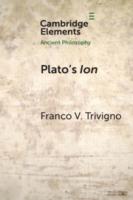
CUP (2020) p/b 68pp £15.00 (ISBN 9781108713450)
This useful short monograph is part of a new Cambridge series ‘Elements in Ancient Philosophy’. T. offers a clear account of the dialogue’s content and progress, pausing to expand on Socrates’ examination and rejection of two models of poetic composition—expertise (technē) and inspiration—before investigating Ion’s exploitation of the shifting semantic area of kalos. He then deals severely with Ion’s ‘foolishness and self-ignorance’, behind which he sees the stock figure of the Old Comedy alazōn, followed by a section on what exactly constitutes Socrates’ well-known eirōneia. T.’s final verdict on Ion is that his delusion as to his powers as a rhapsodic interpreter arises from a passive relationship to Homer. This means that neither model can satisfactorily explain poetry’s high reputation—though both may contain helpful interpretative hints—and that for Socrates (or rather for Plato), ‘critical engagement is the proper way for audiences to treat poetry’.
It is not absolutely clear what T. means by ‘critical engagement’; his argument relies on an invitation to the reader to ‘think beyond what is offered explicitly in the text’, and this leads him to the conclusion that from the evidence of the Ion ‘the interpretation of poetry required not a rhapsode but a philosopher’. This may well be what Plato thought. Certainly there is plenty of evidence elsewhere in his work of a deep interest in poetry, and his implicit (uneasy?) acceptance that the inspirational model may have had something useful to offer. T. does raise this possibility, but he has little opportunity in a brief survey like this to develop it at length.
T. writes well, and gives the reader plenty to think about. His brief survey is a good introduction for students to the early Socratic dialogue, and more importantly to the whole question of Plato’s relationship to poetry.
Anthony Verity
